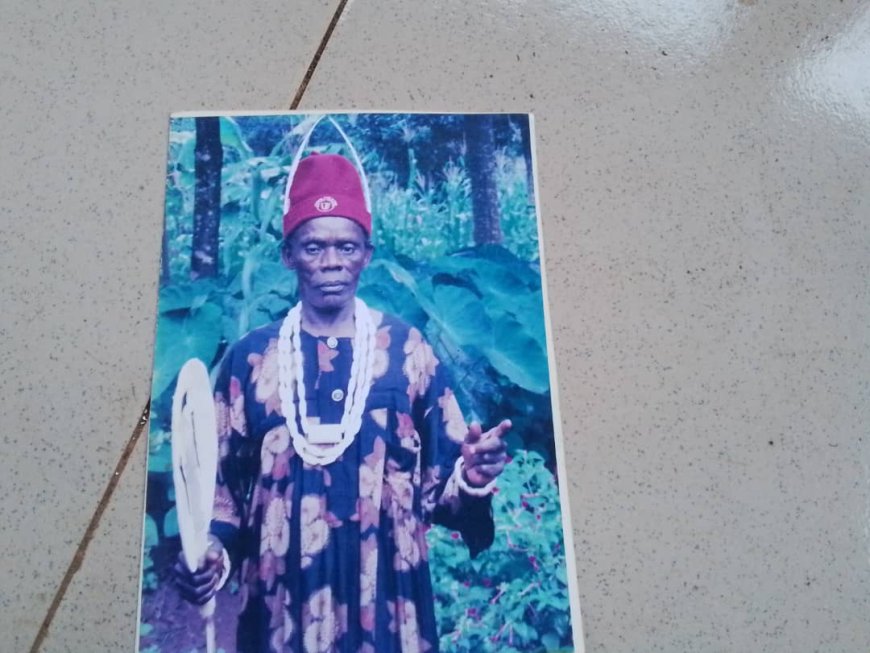By Chris Agbedo
When wisdom wore melodies like a robe,
And truth danced in proverbs wrapped in song,
There stood a man — Ọjịlè in soul and bone - Life Ọyịma, whose art will echo long.
In every age, a voice rises from among the people - not cloaked in royal silk, nor paraded by politics - but rooted in native earth, watered by communal memory, ripened by lived truth, draped in everyday words, dusted in rural idioms, and soaked in native wisdom. Such was Life Ọyịma, the iconic bard of Ezikeọba, whose earthly sojourn ended recently, but whose Ọjịlè music lives on like a sacred echo. Through rhythm, rhyme, and razor-sharp wit, he sang what elders murmured, what the young wrestled with, what society hushed. His music genre, Ọjịlè, was no ordinary entertainment; it was a school of wisdom, a mirror of morals, a museum of cultural memory. In his melodies flowed the laughter, laments, longings, and lessons of a people. Through his musical genre, Life Ọyịma strung together rhythms, rhymes, and tenor to weave a tapestry of wit, humour, justice, romance, and social conscience. Each folk song was more than a performance; it was a public classroom, a moral tribunal, and a mirror held up to Ezikeọba and, by extension, Igbo society. He sang of lovers and liars, drunks and dreamers, saints and sinners. In his lyrics lay laughter, but also lamentation. Beneath the humour danced hard truths. In this tribute, we honour his memory by exploring the interwoven themes of love and romance, folk wisdom, and social reflection, which defined his legendary ‘Ọjịlèric’ artistry.
The death of Life Ọyịma was no ordinary passing. It was the silencing of a cultural custodian, the folding of a voice that once rose with sunrise, narrating the soul of a people with strings of wit, melody, and meaning. In the bustling tradition of Igbo minstrelsy, Ọyịma was a colossus - not merely a singer, but a seer, a social surgeon, and a philosophical griot, who through his Ọjịlè musical genre, wove rhymes into reflections and refrains into reality. His songs were never frivolous. They were his oral scrolls - a people’s memory in melody. His voice did not just entertain; it interrogated, inspired, and indicted. Through songs like “My Dear Love”, “Uzuza Aroke”, and “Oyibo Eze Kai-Kai”, Life Ọyịma sang about love and longing, marriage and malice, folly and fire - holding up a lyrical mirror to both the joys and faults of Ezikeọba and, by extension, the wider Igbo society.
Let us now walk, gently but deliberately, through the thematic universe he created to understand why his death is not merely a transition, but an eclipse. Life Ọyịma’s folk songs - now folklore themselves - orbit around three enduring thematic constellations: romance and love as serenades of the soul, folk wisdom, tales with teeth, and social commentary, leveraging songs that sting with truth to hold society in the mirror. In these, we find the full portrait of a minstrel, who did not merely sing life but interrogated it. No doubt, this 3-part series on the tribute to life and times of Mr. Boniface Ossai, (a.k.a Life Ọyịma), a legendary minstrel, who hailed from Ụmụịyịda Elugwu-Ezikeọba in Igbo-Eze North, Enugu State Nigeria, will not be complete without acknowledging the quiet giant who documented and preserved this musical legacy for future generations - Chief Polycarp Okechukwu Eze. As an award-wining cultural archivist in his own right, ‘Polly’ bent backwards to ensure that not just Life Ọyịma, but the entire oral traditions of Elugwu-Ezike - including Ọshagenyi Azegba, Ọjịle musical groups (Uroko Nwukwuaba), Ijẹfutẹ, Ayịrẹbọ, Ọkwẹ, Akatakpa and Ọmabẹ masquerade festivals, and other folk performance genres - were recorded in audio and video formats. In this first part of the series, I will take you through the multi-faceted web of love as woven by Life Ọyịma.
To listen to Life Ọyịma’s love-themed songs is to step into the soul-chambers of humanity - where affection, betrayal, longing, loyalty, and laughter lie intertwined like the weft and warp of a tapestry. To understand the Ezikeọba folk song crooner is to enter the intimate chambers of the heart, where love is not just a feeling, but a force - mysterious, mischievous, and magnetic. Life Ọyịma did not just sing love; he humanized it, demystified it, and dignified it. He gave it a face and a voice - sometimes weeping, sometimes winking, but always wise. His love songs were not syrupy sweet nothings. They were emotional biographies, riddled with laughter and pain, flirtation and frustration. Love is a many-sided coin, and Life Ọyịma knew each surface intimately. In “My Dear Love”, Ọyịma unraveled the whimsical games lovers play – the coyness and pursuit, longing and withdrawal, a choreography as old as time. But Ọyịma was not naive; he layered the song with irony and caution, revealing how quickly affection can become affliction when love becomes a game. Through teasing refrains and tender satire, he painted courtship as both an art and a battlefield - where desire and deception often dance together; where infatuation meets indecision, and where courtship swings between truth and theatrics.
In “Darling Moo”, he turned the spotlight on the lies of lover boys - a practice, which today’s Gen Z would dub 'premium packaging'. Here, Ọyịma did more than entertain; he warned of polished deceit that hides in flattery, the suitor whose sugar tongue masks sour motives. It was romance of the Gen Z kind - built on illusion, delivered in charisma, and drowned in betrayal. In today’s lingua, he was already singing about ‘audio love’ long before social media gave it hashtags. And when suspicion corrodes affection, “My Own Pack n Go” emerges - a lamentation on distrust between lovers. He sang of relationships turned into rivalries, hearts fenced by fear, where every smile is interrogated. It is one song soaked in suspicion and emotional fatigue, where lovers drift apart not for lack of love, but lack of trust. Ọyịma doesn’t mourn; he reflects - asking whether modern love is now a game of pretence, performance, and packing up.
In “My Lover”, Life Ọyịma opened a window into the fragile theatre of modern courtship, where affection walks a tightrope strung between sincerity and staged seduction. The bard gave voice to those silently hurting - the women and men whose romantic dreams wither in betrayal, whose promises dissolve like mist; where passion is entangled with pretence, and vows melt faster than kisses. Here, Ọyịma does not blame either party; he simply narrates the aching silence that follows romantic noise. His words were drenched in empathy, not judgment.
The song is not just about a lover’s lament; it is a psychological excavation - a tender, tortured soliloquy of someone betrayed by borrowed intentions and make-believe emotions. Ọyịma sings of a love that blossomed in appearance but withered in truth - where ‘I love you’ echoed like a script recited, not a soul spoken. He captures the paradox of passion polluted by pretence, the gnawing pain of a heart that invested deeply, only to discover it had been sold an illusion. Here, Life Ọyịma becomes both balladeer and philosopher, cautioning that when romance is reduced to role-play, heartbreak becomes inevitable. He unmasks the emotional “packaging” - the Gen Z flair for curated affection - and reveals the ache behind every silent goodnight, every ghosted promise, every love story that ended mid-sentence.
But no sooner had the tears dried than came “Ezigbo Ji m”, a soul-hymn to the devout husband - the silent sentinel of sacrifice, whose presence is more protection than poetry. Ọyịma shifts tone here, from lament to liturgy, offering a reverent song to the unsung man, the one who bears burdens too heavy for words, whose strength is measured not in noise but in nobility. Ọyịma celebrates the stoic male figure who bears burdens, bottles pain, and builds the home through silent sacrifices. In a world quick to mock masculinity, Life Ọyịma composed a ballad of emotional reverence, reminding us that real men weep - not from weakness, but from weary love. While popular culture celebrates the strong woman who holds the home, Ọyịma sang a rare soul-hymn to the sacrificing husband - the unsung man who carries burdens with quiet fortitude, whose love is practical not performative. He sees in him a silent hero, whose masculine tears are never seen but deeply felt.
He bows his heart to this man - not the boastful peacock, but the quiet rock - the husband, who works and weeps in silence, who bleeds but believes, who is mocked by a world that forgets that masculinity, at its truest, is gentle, enduring, and selfless. In Ezigbo Ji m, Life Ọyịma challenges modern narratives that only sing of toxic masculinity, choosing instead to elevate the often-erased masculine virtues of fidelity, resilience, and uncelebrated love. He sees in this husband a kind of quiet heroism - not clad in capes, but wrapped in worn wrappers after a long day’s toil, providing, protecting, and praying. Together, “My Lover” and “Ezigbo Di m” form a lyrical diptych - love’s disillusionment on one side, and love’s devotion on the other. In one, we mourn what love has become. In the other, we remember what love should be.
Through these love songs, Life Ọyịma knitted a tapestry of love with thread of philosophy. He sees love not as a straight line, but a spiral - at times sweet, at times sour; at times comic, at times cathartic. He probes its beauty, mourns its betrayal, laughs at its illusions, and celebrates its quiet triumphs. In these love ballads, Life Ọyịma became not just a singer of hearts, but a custodian of emotional truth. He serenaded affection, but he also dissected its wounds, always with the balm of understanding. Through these songs, Life Ọyịma revealed his emotional intelligence, his insight into the complex architecture of love - not as fantasy, but as fragile reality. He was not just singing about others. He was singing us to ourselves.
...To be continued
Agbedo, is a Professor of Linguistics, University of Nigeria Nsukka, Fellow of Netherlands Institute for Advanced Study, and Public Affairs Analyst




































































